Empowering Students Through the Lens of Adaptive Competencies
CompetencyWorks Blog
Competency-Based Education in Chicago Public Schools
In 2017, the Chicago Public Schools (CPS) became one of 10 districts in Illinois to participate in an innovative competency-based education (CBE) pilot program. The pilot was in response to the 2016 Postsecondary and Workforce Readiness Act, which acknowledged the need for implementing intentional strategies to support students with building the skills necessary for success in college, career, and life. Currently, 10 high schools in the district, each with unique models and diverse needs and student populations, are participating in the pilot and receiving a high level of district support to implement a competency-based program that meets their individual needs. Damarr Smith, the Senior Program Manager for Competency-Based Education in CPS, has developed the district’s approach to CBE and has engaged thought leaders within the state of Illinois and across the country to identify and codify best practices.
School administrators and teacher leaders from the 10 schools in CPS meet regularly to share best practices, learn from each other, and evaluate the effectiveness of implementation. While schools have the autonomy to set their scope of implementation, there are guiding principles that connect all of the schools. The Adaptive Pacing Tool, which was co-created by leaders in each of the pilot schools, aligns practices across the schools and ensures that the foundation of CBE is consistent throughout the district. The seven elements of adaptive pacing are shown below, and the full document provides more detailed descriptions.
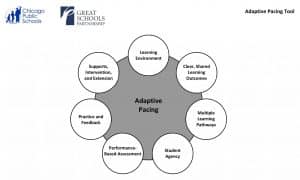
An additional essential component of CBE in the Chicago Public Schools is Social & Emotional Learning (SEL) Integration. We know that for successful implementation of CBE we must focus on the whole child. Educators in the CBE schools are charged with supporting students to develop a growth mindset, persevere through challenges, have agency to advocate for themselves, and respond to feedback from their peers, teachers, and other trusted adults. This is where SEL meets the adaptive competencies.
What are Adaptive Competencies?
The skills that transfer from elementary and secondary school to college, career, and life are often called “soft skills,” “21st-century skills,” “foundational skills,” or “success skills.” These non-academic competencies, or adaptive competencies, are those transferable skills that we continue to develop at all stages of our lives.
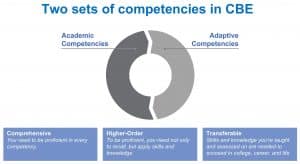
Imagine you are hiring a new teammate for an important project at work. Would you be looking for someone who can communicate effectively, collaborate well, take initiative, solve problems, think critically, make decisions strategically? This list could go on and on. In Chicago, we asked school leaders this same question, and the long list of competencies they came up with would be nearly impossible for a teacher to explicitly teach (effectively) in a given school year. We knew our next task was to narrow down the list of competencies. Which were the most important? Which were the most relevant for our young people? Which would empower Chicago’s youth to navigate the world in which we live?
To arrive at our final list, we needed to develop a vision of our graduates. In Chicago, we aim to build future leaders who will inspire much-needed positive change in our communities, our city, and our world. We want our students to be able to work collaboratively with others regardless of their race, class, culture, gender, sexual orientation, age, or ability. We know that in order for our students to persevere through challenges, they must be able to adapt and remain flexible in the face of adversity, in response to feedback, and as they gain new information and experience. Ultimately, our goal is that our students have the agency to pursue their passions, have choices and voice in their future, and internalize self-efficacy in order to break through barriers and accomplish the goals they set for themselves.
Key Adaptive Competencies at Chicago Public Schools
Based on these considerations, we developed a final list of four key adaptive competencies: Agency, Collaboration, Adaptability & Flexibility, and Leadership. Teachers are charged with both explicitly teaching these adaptive competencies and embedding them in student learning experiences. School administrators are charged with ensuring that systems and structures are in place to allow students to practice, demonstrate, and utilize these skills in various ways.
In the classroom, through performance-based tasks and assessments, teachers incorporate real-world learning experiences that allow students to collaborate with peers, trusted adults, experts in the field, and community organizations to develop innovative solutions to existing problems that could positively impact their community. Projects like these allow students to give and receive feedback, reflect on their learning, lead important work, and explore potential career paths of interest. Students develop the adaptive competencies through targeted instruction and feedback, practice and reflection, and real-world application.
A Closer Look at Student Agency
In Chicago, we hope that, through a focus on the adaptive competency of Agency, students will be able to take ownership and responsibility for their learning and the pace at which they learn best through goal setting, taking initiative, self-reflection, and internalizing self-efficacy. We have crafted descriptors of agency corresponding to the CASEL competencies of Self-Awareness and Self-Management, Social Awareness and Relationship Skills, and Responsible Decision Making, shown below.
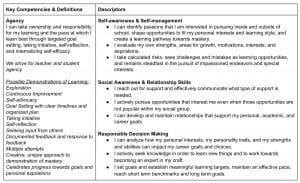
Joanna Deming, a teacher at a college preparatory high school in Chicago, asks her students to reflect on their strengths and areas for growth for each of these descriptors, shown below. Then she identifies student supports based on that self-reflection and evaluation. Other teachers also engage students in a rigorous goal-setting process for their academic and personal aspirations. This way students, with the necessary amount of support, can set smaller goals for themselves, monitor their progress, and successfully accomplish their long-term goals.
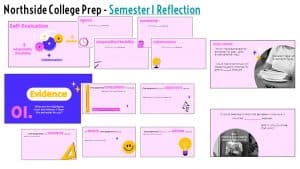
In Mel Gerleve’s class on the South Side of Chicago, she was able to use Jamboard (an online tool) for students to share their personal reflections and discuss them as a class. This was a great way to build a trusting classroom community and a “brave space” where students could be vulnerable, sharing their strengths and areas for growth, and receiving supportive feedback. Ms. Gerleve could then reach out to individual students for interventions or supports as needed, as well as planning whole-group lessons based on trends in the students’ reflections.
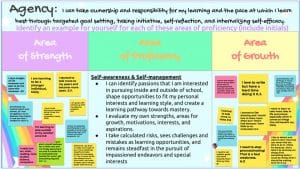
Social Justice
Teacher leaders who have engaged in the work of SEL Integration at the CBE schools in Chicago have made a commitment to designing performance-based assessments (PBAs) through the lens of social justice and cultural relevance. It is so important for students to see themselves in the work they do and to work to solve problems that matter to them. Students’ identities, relationships, and communities are the center of our work.
In Shoshana Ostrum’s Mixed Media Art class, she was able to incorporate all four of the adaptive competencies into a performance-based assessment in which students designed and presented public service announcements based on their interests and lived experiences to bring awareness to real-world challenges young people face. Projects included an art installation promoting kindness and togetherness during difficult times, letters to public officials about the need to bring healthier food options or more affordable housing to underserved neighborhoods in the city, and many others. Some of their public service announcements are shown below.
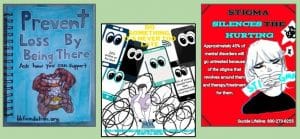
The students were highly engaged in research, design, and presenting their ideas to their peers in a virtual format. Students could critique each other’s work and ask questions about the specific content of each public service announcement. Ms. Ostrum and her students learned more about challenging topics that are impacting young people and their community. The rich learning experience focused on social justice empowered the young people to develop key adaptive competencies while becoming the innovative, creative, compassionate, and civic-minded leaders they are destined to be.
Learn More
- Habits of Mind and Learning New Ways of Learning at Journey Elementary
- Eastern Carver’s Framework for Lifelong Learning Skills
- New Hampshire’s Work Study Practices – A Five-Year Journey to Understand, Share, Scale, Deepen, and Meaningfully Assess These Critical Competencies
 Tonya Howell is the Competency-Based Education Social & Emotional Learning Integrationist for the Competency-Based Education Team at Chicago Public Schools, which she joined in 2019. She has been an educator for two decades. Tonya was a teacher, coach of new teachers, instructional coach, and principal. Now she supports school leaders with integrating SEL into their curricula and daily practices. With her guidance, teachers have designed performance-based assessments grounded in social justice and the development of crucial skills such as being collaborative, responsive, and an impactful leader. Through the lens of CBE, Tonya is charged with ensuring that students have the opportunity to demonstrate proficiency and are skilled in the adaptive competencies necessary for success in high school, college, career, and life.
Tonya Howell is the Competency-Based Education Social & Emotional Learning Integrationist for the Competency-Based Education Team at Chicago Public Schools, which she joined in 2019. She has been an educator for two decades. Tonya was a teacher, coach of new teachers, instructional coach, and principal. Now she supports school leaders with integrating SEL into their curricula and daily practices. With her guidance, teachers have designed performance-based assessments grounded in social justice and the development of crucial skills such as being collaborative, responsive, and an impactful leader. Through the lens of CBE, Tonya is charged with ensuring that students have the opportunity to demonstrate proficiency and are skilled in the adaptive competencies necessary for success in high school, college, career, and life.